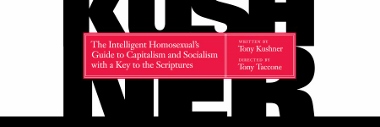TWO TONY’S UNITE FOR ONE OF THE BIGGEST THEATER EVENTS OF THE YEAR
For anybody starved for smart and thrilling playwriting, your destination is Berkeley Rep, which is unfurling the West Coast premiere of Tony Kushner’s latest play, The Intelligent Homosexual’s Guide to Capitalism and Socialism with a Key to the Scriptures, which officially opens tomorrow, May 21.
 While the lengthy title may seem pretentious to those unfamiliar with Kushner’s oeuvre, it’s a forecast for me that the author of both the greatest play (Angels in America) and the greatest musical (Caroline, or Change) of the last quarter-century is up to something much bigger than standard theatrical fare. Oskar Eustis, producer of the 2011 Off-Broadway version at The Public says that the play is as brilliant, witty, and yes, intelligent as the title suggests. (Kushner’s spouse Mark nicknamed his husband’s play iHo; Kushner recommends that truncated version of the title when referencing it because, he writes, “It’s much easier to remember.”)
While the lengthy title may seem pretentious to those unfamiliar with Kushner’s oeuvre, it’s a forecast for me that the author of both the greatest play (Angels in America) and the greatest musical (Caroline, or Change) of the last quarter-century is up to something much bigger than standard theatrical fare. Oskar Eustis, producer of the 2011 Off-Broadway version at The Public says that the play is as brilliant, witty, and yes, intelligent as the title suggests. (Kushner’s spouse Mark nicknamed his husband’s play iHo; Kushner recommends that truncated version of the title when referencing it because, he writes, “It’s much easier to remember.”)
This production is directed by Berkeley Rep’s artistic director, Tony Taccone, who co-directed with Eustis the 1992 world premiere of Perestroika, Part Two of Angels in America: A Gay Fantasia on National Themes at the Mark Taper Forum. (Part One, Millennium Approaches, received its world premiere in May 1991 right here in  San Francisco by the Eureka Theatre Company, directed by David Esbjornson). Taccone is the one who commissioned the legendary two-part Pulitzer- and Tony Award-winning work, and iHo marks his eighth collaboration with Kushner.
San Francisco by the Eureka Theatre Company, directed by David Esbjornson). Taccone is the one who commissioned the legendary two-part Pulitzer- and Tony Award-winning work, and iHo marks his eighth collaboration with Kushner.
iHo was written in 2009 for the Guthrie Theater in Minneapolis and subsequently opened, somewhat rewritten, in a co-production between The Public and Signature theaters in New York. Taccone states: “It had an intense life, both at the Guthrie and The Public. I think Tony felt’”because of the circumstances in which it was written, which was under an enormous amount of pressure’”that he never really completely got to finish the play.” Indeed, Guthrie Artistic Director Joe Dowling said that rehearsals began for the play without a completed script, an almost-unprecedented situation for the theater. Actors were working with scripts in hand during preview performances as Kushner continued to tweak the work.
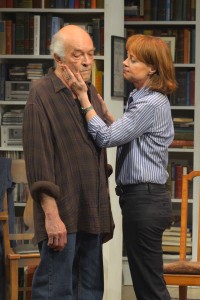 For the Berkeley Rep outing, author and director talked about the play for over a year before it went into production, “and we’re both excited to approach it with fresh eyes,” said Taccone. And the buzz is amazing. I know people coming in from New York to Los Angeles (including myself) to see the show.
For the Berkeley Rep outing, author and director talked about the play for over a year before it went into production, “and we’re both excited to approach it with fresh eyes,” said Taccone. And the buzz is amazing. I know people coming in from New York to Los Angeles (including myself) to see the show.
Actually, I would attend a reading of Kushner’s notes scribbled on a napkin. His work excites me in the way that Arthur Miller’s does. Aside from being Jewish playwrights, both use theater for social advocacy. I am a Kushner enthusiast for the same reasons he admires Miller. As the editor of Arthur Miller: Collected Plays 1944-1961, Kushner wrote, “For American playwrights who come after Miller, there is of course an unpayable debt. Those of us who seek mastery of dramatic realist narrative have his plays to try to emulate. Scene after scene, they are perhaps our best constructed plays, works of a master.”
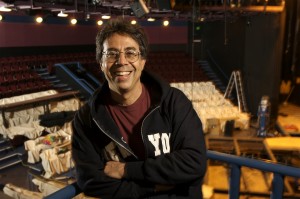 In an interview with Jspace, Kushner stated, “In terms of social advocacy, Arthur is important as a model in two ways. In one way because he doesn’t write polemic, he writes drama, which is really different. And the plays are not plays that present problems and provide answers for those problems; they’re deeper and more complicated and more tortured than that. That’s when they’re at their best. And as the plays progress, they become more and more what we would call personal, and less and less obviously political.”
In an interview with Jspace, Kushner stated, “In terms of social advocacy, Arthur is important as a model in two ways. In one way because he doesn’t write polemic, he writes drama, which is really different. And the plays are not plays that present problems and provide answers for those problems; they’re deeper and more complicated and more tortured than that. That’s when they’re at their best. And as the plays progress, they become more and more what we would call personal, and less and less obviously political.”
 Regarding iHo, Taccone states, “Kushner is extremely interested in history, especially the enormous questions, uncertainties, reassessments, and doubts that beset the Political Left after the close of the 20th century, and drama essentially is about exploring those questions much more than providing answers or programs. Like most Kushner plays, it uses a particular dramatic situation to examine larger issues in contemporary society. Focused on an Italian-American family in Brooklyn in 2008, Intelligent Homosexual’s Guide grapples with the consequences of hyper-capitalism, the paralysis of the Left, and the emotional chaos at the heart of a family trying to grapple with a father bent on suicide. But it wouldn’t be Kushner if it wasn’t filled with humor, pathos, and a profound yearning for a better life. Its length, always a factor with Tony’s plays, is a testament to the breadth and depth of the author’s mind.”
Regarding iHo, Taccone states, “Kushner is extremely interested in history, especially the enormous questions, uncertainties, reassessments, and doubts that beset the Political Left after the close of the 20th century, and drama essentially is about exploring those questions much more than providing answers or programs. Like most Kushner plays, it uses a particular dramatic situation to examine larger issues in contemporary society. Focused on an Italian-American family in Brooklyn in 2008, Intelligent Homosexual’s Guide grapples with the consequences of hyper-capitalism, the paralysis of the Left, and the emotional chaos at the heart of a family trying to grapple with a father bent on suicide. But it wouldn’t be Kushner if it wasn’t filled with humor, pathos, and a profound yearning for a better life. Its length, always a factor with Tony’s plays, is a testament to the breadth and depth of the author’s mind.”
 With his trademark mix of soaring intellect and searing emotion, the renowned playwright offers, per Taccone, “an epic tale about this seminal, iconic New York family whose patriarch Gus,” a member of the Communist Party, “has decided to gather his family to make the announcement that in order to maximize the inheritance that he can leave them, he’s gonna kill himself.” When his kids come home with a raucous parade of lovers and spouses, “this revelation, of course, sends the entire family into complete chaos for four hours” [including two intermissions]. The kids will come to discover that even the house keeps secrets.
With his trademark mix of soaring intellect and searing emotion, the renowned playwright offers, per Taccone, “an epic tale about this seminal, iconic New York family whose patriarch Gus,” a member of the Communist Party, “has decided to gather his family to make the announcement that in order to maximize the inheritance that he can leave them, he’s gonna kill himself.” When his kids come home with a raucous parade of lovers and spouses, “this revelation, of course, sends the entire family into complete chaos for four hours” [including two intermissions]. The kids will come to discover that even the house keeps secrets.
 Kushner is a master at finding universal themes while magnifying issues of the day (another Miller trademark). “iHo explores revolutionary versus evolutionary change,” Kushner wrote. “The history of Italian-American radicalism, marriage, sex, sexual identity, prostitution, parenting, politics, theology, real estate, debts both repaid and unpayable, and unions of all kinds.”
Kushner is a master at finding universal themes while magnifying issues of the day (another Miller trademark). “iHo explores revolutionary versus evolutionary change,” Kushner wrote. “The history of Italian-American radicalism, marriage, sex, sexual identity, prostitution, parenting, politics, theology, real estate, debts both repaid and unpayable, and unions of all kinds.”
There was praise from critics who saw the original productions. The New York Times: “Theatergoers who have previously thrilled to Mr. Kushner’s heady language and his visceral commitment to ideas made flesh are sure to feel a rush of the old excitement [as iHo] explodes into a babel of fast-talking, passionate voices’”slapping and overlapping, twining and crashing into one another. You may find yourself sitting back and grinning at this noisy spectacle of so many people having so much to say with so much passion and eloquence.” The Nation: It’s “that rarest of theater delights’”a big, noisy, sexy play in which argument is hot and throbbing’¦Bear witness to Tony Kushner’s roaring new play [and] banquet on rich and delectable passions and ideas, washed down with lashings of wit.”
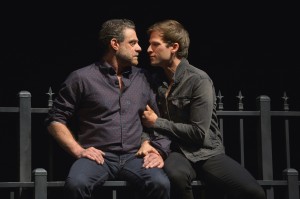 Michael Greif, who directed the original production at the Guthrie, gives insight into the play’s title. He wrote, “The Intelligent Homosexual’s Guide to Capitalism and Socialism with a Key to the Scriptures is inspired by two 19th century works written by two 19th century powerful thinkers. The first is George Bernard Shaw; the second is Mary Baker Eddy. Shaw’s work is called An Intelligent Woman’s Guide to Socialism and Capitalism. Eddy’s work is called Science and Health with Key’”not ‘a Key’ but ‘with Key’’”to the Scriptures.”
Michael Greif, who directed the original production at the Guthrie, gives insight into the play’s title. He wrote, “The Intelligent Homosexual’s Guide to Capitalism and Socialism with a Key to the Scriptures is inspired by two 19th century works written by two 19th century powerful thinkers. The first is George Bernard Shaw; the second is Mary Baker Eddy. Shaw’s work is called An Intelligent Woman’s Guide to Socialism and Capitalism. Eddy’s work is called Science and Health with Key’”not ‘a Key’ but ‘with Key’’”to the Scriptures.”
 Greif goes on to sum up how history plays its part in Kushner’s work: It begins with 19th-century thinkers and then leads to Gus, a powerful 20th century thinker who finds himself very confused by the 21st century. “But the play is mostly about belonging,” Greif adds. “Belonging to a community, belonging to a group, belonging to your lover, your spouse, your ex-spouse. Belonging to a way of thinking about the world and what happens when all of those connections get tested or get severed. This is what really unites the play, the importance for all of them to hold onto, to nourish, and to be given life by those connections.”
Greif goes on to sum up how history plays its part in Kushner’s work: It begins with 19th-century thinkers and then leads to Gus, a powerful 20th century thinker who finds himself very confused by the 21st century. “But the play is mostly about belonging,” Greif adds. “Belonging to a community, belonging to a group, belonging to your lover, your spouse, your ex-spouse. Belonging to a way of thinking about the world and what happens when all of those connections get tested or get severed. This is what really unites the play, the importance for all of them to hold onto, to nourish, and to be given life by those connections.”
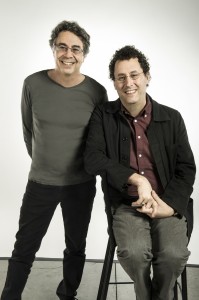 Perhaps it is love, that ever-pervasive theme in Angels in America, that truly resides at the heart of this play. Taccone said, “There aren’t many people in the world that I know who can write a love story in terms of the Marxist theory of surplus value, and he can.”
Perhaps it is love, that ever-pervasive theme in Angels in America, that truly resides at the heart of this play. Taccone said, “There aren’t many people in the world that I know who can write a love story in terms of the Marxist theory of surplus value, and he can.”
The cast features Tina Chilip (Sooze), Randy Danson (Clio), Anthony Fusco (Adam), Jordan Geiger (Eli), Tyrone Mitchell Henderson (Paul), Lou Liberatore (Pill), Deirdre Lovejoy (Empty), Mark Margolis (Gus), Joseph J. Parks (Vito), Robynn Rodriguez (Shelle), and Liz Wisan (Maeve).
The creative team includes Christopher Barecca (scenic designer), Meg Neville (costume designer), Alexander V. Nichols (lighting designer), Jake Rodriguez (sound designer), and Julie Wolf (music consultant).
photos by kevinberne.com
The Intelligent Homosexual’s Guide
to Capitalism and Socialism with a Key to the Scriptures
Berkeley Rep
Berkeley Repertory Theatre’s Roda Theatre
2015 Addison Street @ Shattuck
scheduled to end on June 29, 2014
for tickets, call 510 647–2949 or visit www.berkeleyrep.org
